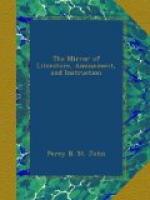What nations, with their kings!
I feel no shock, I hear no groan,
While fate, perchance, o’erwhelms
Empires on this subverted stone—
A hundred ruined realms!
Lo! in that dot, some mite, like me,
Impelled by woe or whim,
May crawl, some atom’s cliffs to see—
A tiny world to him!
Lo! while he pauses, and admires
The works of nature’s might,
Spurned by my foot, his world expires,
And all to him is night!
Oh, God of terrors! what are we?—
Poor insects sparked with thought!
Thy whisper, Lord, a word from thee,
Could smite us into naught!
But should’st thou wreck our father-land,
And mix it with the deep,
Safe in the hollow of thy hand
Thy little one will sleep.
Amulet.
[5] The hedge-sparrow.
[6] The dandelion.
[7] The golden-crested wren.
* * * * *
RETROSPECTIVE GLEANINGS.
* * * * *
POVERTY.
Owen Feltham says—“The poverty of a poor man is the least part of his misery. In all the storms of fortune, he is the first that must stand the shock of extremity. Poor men are perpetual sentinels, watching in the depth of night against the incessant assaults of want; while the rich lie strowd in secure reposes, and compassed with a large abundance. If the land be ruffetted with a bloodless famine, are not the poor the first that sacrifice their lives to hunger? If war thunders in the trembling country’s lap, are not the poor those that are exposed to the enemy’s sword and outrage? If the plague, like a loaded sponge, flies, sprinkling poison through a populous kingdom, the poor are the fruit that are shaken from the burdened tree; while the rich, furnished with the helps of fortune, have means to wind out themselves, and turn these sad indurances on the poor, that cannot avoid them. Like salt-marshes, that lie low, they are sure, whenever the sea of this world rages, to be first under, and embarrened with a fretting care. Who like the poor are harrowed with oppression, ever subject to the imperious taxes, and the gripes of mightiness? Continual care checks the spirit; continual labour checks the body; and continual insultation both. He is like one rolled in a vessel full of pikes—which way soever he turns, he something finds that pricks him. Yet, besides all these, there is another transcendent misery—and this is, that maketh men contemptible. As if the poor man were but fortune’s dwarf, made lower than the rest of men, to be laughed at. The philosopher (though he were the same mind and the same man), in his squalid rags, could not find admission, when better robes procured both an open door and reverence. Though outward things can add nothing to our essential worth, yet,




